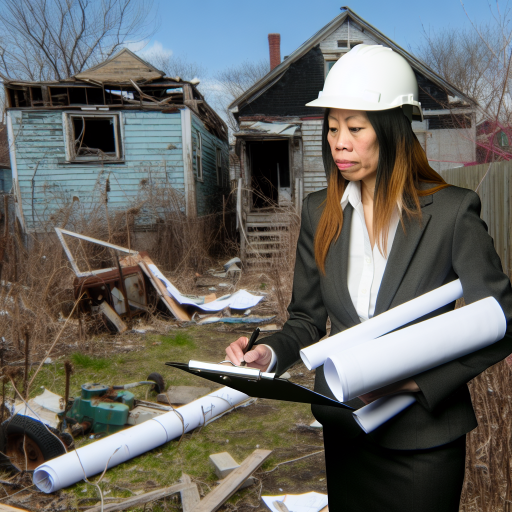Define Your House Flipping Goals and Objectives
Start by clarifying your vision for house flipping.
Identify specific goals you want to achieve.
Consider your target market and property types.
Will you focus on single-family homes or multi-units?
Next, outline your financial objectives.
Determine your budget and potential profit margins.
Factor in renovation costs and timelines.
Additionally, establish a timeline for your projects.
How quickly do you want to flip each property?
Setting a clear timeline helps maintain focus.
Finally, document all your goals and objectives.
Having written goals increases accountability.
Review your objectives regularly to stay on track.
Use this information to guide team selection.
Team members should align with your overall vision.
This clarity fosters better collaboration moving forward.
Identify the Key Roles Needed for Your Team
Construction Manager
A construction manager oversees all aspects of a house flipping project.
They ensure that the project stays on schedule and within budget.
This person coordinates between various contractors and tradespeople.
Effective communication is essential in this role.
Real Estate Agent
A reliable real estate agent helps find profitable properties.
They offer insights into the local market trends and pricing.
This professional can also assist in selling the flipped houses.
Choosing an agent with a proven track record is crucial.
Financial Advisor
A financial advisor guides on budgeting and investment strategies.
They help assess the financial viability of each project.
This expert can also assist with securing funding and managing cash flow.
Understanding financial risks is a vital component of flipping homes.
Contractors and Tradespeople
Hiring skilled contractors is essential for successful renovations.
This group may include plumbers, electricians, and carpenters.
Look for professionals with proper licensing and experience.
Establishing relationships with reliable tradespeople is beneficial.
Home Inspector
A home inspector assesses properties before purchase.
They identify potential issues that could impact renovations.
Thorough inspections can prevent costly surprises later.
Finding an inspector with a solid reputation is important.
Interior Designer
An interior designer enhances the aesthetic appeal of homes.
The designer can suggest optimal layouts and color schemes.
This role adds value and marketability to the finished property.
Collaborating with an interior designer can lead to lucrative results.
Research and Scout Potential Team Members
Define Your Needs
Begin by identifying the skills necessary for your house flipping projects.
Consider roles such as contractor, realtor, and designer.
Each role plays a distinct part in your overall success.
Ensure you understand the expertise each position requires.
Utilize Your Network
Reach out to your professional network for recommendations.
Friends and colleagues can provide valuable insights.
Consider attending local real estate events to meet potential candidates.
Research Online Platforms
Explore online platforms dedicated to real estate and construction.
Websites like LinkedIn and Thumbtack are great places to start.
Look for reviews and past projects to gauge their expertise.
Interview Potential Candidates
Once you identify promising candidates, arrange interviews.
Prepare questions that assess their experience and approach.
Focus on how they handle challenges in their field.
Check References
Always ask for and verify references from previous clients or employers.
This step helps ensure their credibility and reliability.
A strong reference can highlight their strengths and work ethic.
Evaluate Fit Within Your Team
Consider how well each candidate fits within your existing team.
Cultural fit often influences team dynamics and productivity.
Encourage open communication to assess compatibility.
Uncover the Details: How to Leverage Tax Benefits to Maximize Real Estate Profits
Evaluate Candidates Based on Experience and Skills
Understanding Required Skills
Identify the key skills necessary for house flipping ventures.
This can include project management, negotiation, and financial acumen.
Additionally, knowledge of local real estate markets is essential.
Reviewing Experience Levels
Evaluate candidates based on their previous experience in house flipping.
Look for evidence of successful projects they have completed.
Consider their roles in those projects to understand their contributions.
Assessing Technical Skills
Technical skills play a crucial role in successful flipping.
Assess candidates for skills in construction and renovation techniques.
Also, evaluate their understanding of design and market trends.
Conducting Interviews
Use interviews to gauge candidates’ qualifications in depth.
Ask specific questions related to previous projects they have managed.
Encourage candidates to share challenges they have faced and overcome.
Checking References
Always check references to validate candidates’ claims.
Connect with past employers or project partners for their insights.
Gather information on work ethics and reliability from these references.
Considering Cultural Fit
Evaluate how well candidates align with your team’s culture.
Strong alignment leads to a more cohesive and productive team.
This can greatly affect the overall success of your projects.
Uncover the Details: Strategies For Managing Renovation Budgets In House Flipping
Conduct Interviews to Assess Team Compatibility
Preparation for Interviews
Start by defining the key roles needed in your team.
Identify the skills and qualities essential for each role.
Create a list of interview questions that reflect your requirements.
Consider involving other team members in the interview process.
This inclusion fosters a sense of shared responsibility.
Conducting the Interviews
Begin each interview with a brief introduction of your project.
This context helps candidates understand your goals.
Ask open-ended questions to gauge their problem-solving abilities.
Evaluate their communication style during the interview.
Notice if they ask insightful questions about your vision.
Assessing Compatibility
After the interviews, discuss impressions with your team.
Consider how well candidates align with your team’s dynamics.
Examine their cultural fit within your organization.
Ensure their values resonate with your objectives.
Remember, a compatible team enhances efficiency and morale.
Making the Final Decision
Compile notes and feedback from all interviews.
Weigh their technical skills against their interpersonal qualities.
Trust your instincts about who will add value to your team.
Once you decide, communicate openly about your choice.
This transparency builds a foundation of trust from the start.
You Might Also Like: Understanding Tenant Screening To Minimize Rental Property Risks
Establish Clear Communication and Collaboration Protocols
Setting Up Communication Channels
Establish reliable communication channels within your team.
Consider using tools like Slack or Microsoft Teams.
These platforms facilitate real-time communication and collaboration.
Moreover, ensure everyone has access to these tools.
Regular Team Meetings
Schedule regular meetings to discuss ongoing projects.
Weekly meetings can help keep everyone updated.
Ensure your agenda covers key topics for discussion.
Involve team members in setting the agenda.
Encouraging Open Feedback
Create an environment where team members feel comfortable giving feedback.
Encourage open discussions about project challenges.
Use surveys or suggestion boxes to gather anonymous feedback.
Address concerns promptly to maintain trust within the team.
Utilizing Project Management Software
Adopt project management software like Trello or Asana.
These tools help track progress and tasks across your team.
Assign clear responsibilities to each team member.
Regularly review progress together to ensure alignment.
Defining Roles and Expectations
Clearly define roles and expectations for each team member.
Outline responsibilities to avoid confusion and overlap.
Discuss these roles during team meetings for transparency.
This clarity fosters accountability and enhances collaboration.
Building Relationships
Encourage team bonding through team-building activities.
These activities can enhance relationships and improve communication.
Consider both in-person and virtual options to accommodate everyone.
Strong relationships lead to better collaboration and trust.
Explore Further: The Pros and Cons of Investing in Vacation Rental Properties

Create a Structured Workflow and Accountability System
Define Roles and Responsibilities
Establish clear roles within your team.
This clarity avoids confusion during projects.
Additionally, define responsibilities for each role.
Everyone should know their specific tasks.
Implement Project Management Tools
Utilize project management software to streamline processes.
Tools like Trello or Asana can help manage tasks effectively.
Ensure all team members are trained to use these tools.
This fosters collaboration and accountability.
Establish Regular Check-Ins
Schedule weekly team meetings to discuss progress.
During these meetings, address any obstacles encountered.
Encourage open communication among all members.
This builds trust and promotes team cohesion.
Create a Feedback Loop
Gather feedback from team members regularly.
This input can help improve processes and strategies.
Moreover, it empowers team members to contribute ideas.
Implement changes based on constructive feedback.
Set Goals and Monitor Progress
Establish specific, measurable goals for each project.
Track these goals regularly to ensure progress.
Use visual aids to display team progress.
This transparency motivates team members to stay on track.
Encourage Accountability
Develop systems that encourage responsibility.
Assign accountability partners within the team.
Regularly review each member’s contributions.
Accountability fosters a sense of ownership in the work.
Foster a Positive Team Culture and Motivation Strategies
Creating a Supportive Environment
A supportive environment encourages open communication among team members.
Start by establishing trust within the group.
Trust enhances collaboration and reduces misunderstandings.
Furthermore, promote respect among team members.
Respect fosters a sense of belonging and unity.
Regular Team Building Activities
Engage in regular team building activities to strengthen relationships.
These activities can be both work-related and recreational.
Ultimately, they enhance team cohesion and morale.
Consider options like workshops or social events.
Such experiences create shared memories and bonds.
Recognition and Rewards
Recognizing achievements boosts team motivation significantly.
Implement a timely and specific recognition program.
Celebrate both individual and team successes.
Additionally, consider small rewards to incentivize performance.
Rewards can include certificates, bonuses, or team outings.
Encouraging Open Feedback
Encouraging open feedback helps improve team dynamics.
Hold regular feedback sessions to discuss progress and challenges.
This practice shows team members that their opinions matter.
Moreover, it identifies areas for improvement effectively.
Setting Clear Goals and Expectations
Clearly defined goals guide team efforts in a unified direction.
Establish individual and team objectives early on.
Ensure that everyone understands their roles and responsibilities.
Regularly revisit these goals to assess progress.
This keeps the team focused and motivated.
Implement Ongoing Training and Development Opportunities
Recognize the Importance of Training
Training is crucial for building a reliable house flipping team.
It equips team members with necessary skills and knowledge.
Moreover, continuous training encourages growth and innovation.
Identify Relevant Skills
Determine the specific skills your team needs.
Consider aspects like project management, budgeting, and design.
For instance, training in negotiation can improve deal-making abilities.
Provide Regular Training Sessions
Schedule regular training sessions to keep skills updated.
Ensure that sessions address both technical and soft skills.
Involve industry experts to provide valuable insights.
Encourage Cross-Training
Implement cross-training to enhance team versatility.
By learning different roles, team members become more adaptable.
This approach can improve overall project efficiency.
Utilize Online Resources
Make use of online courses and webinars for flexible learning.
These resources often cover a wide range of topics.
Team members can engage with materials at their own pace.
Foster a Culture of Learning
Create an environment that promotes continuous learning.
Encourage team members to share knowledge and experiences.
Reward those who take the initiative to learn new skills.
Evaluate Training Effectiveness
Regularly assess the effectiveness of training programs.
Gather feedback from team members to identify areas for improvement.
Make adjustments based on performance and satisfaction levels.
Additional Resources
I am a failed real estate investor. Here’s what I learned. : r …




